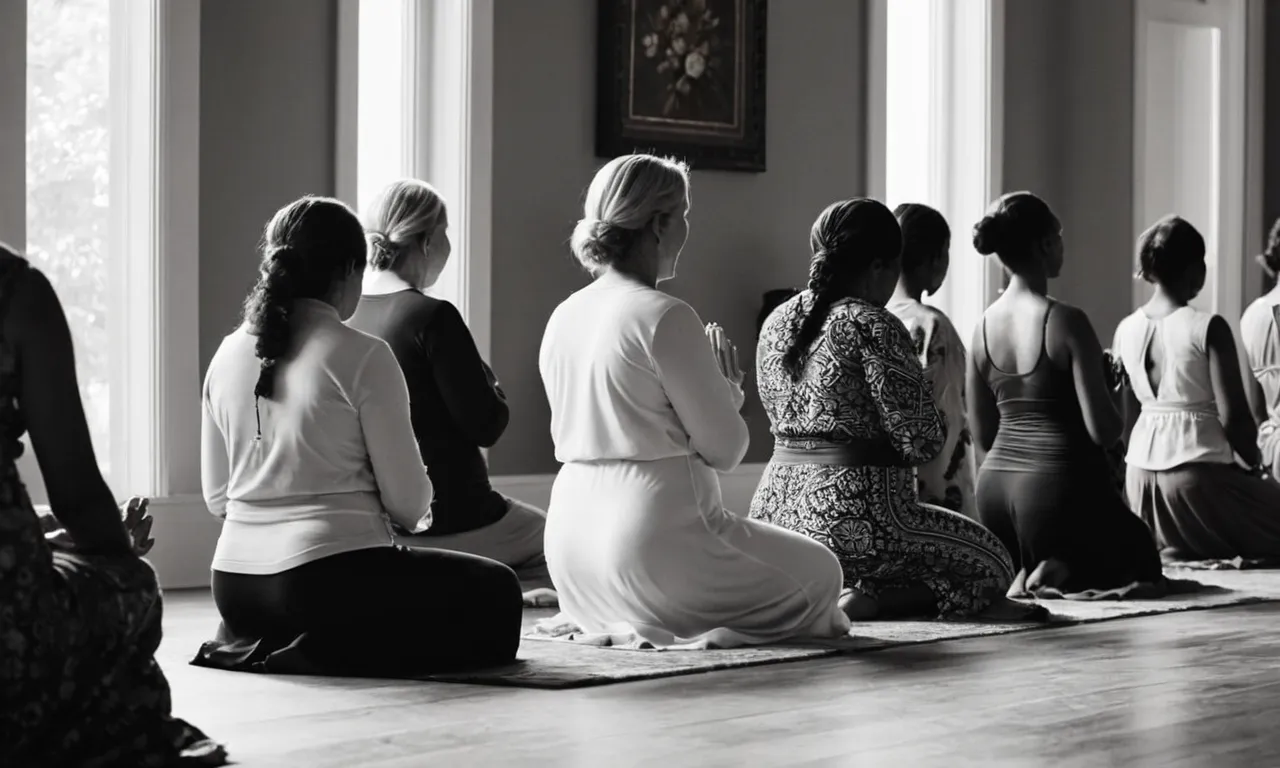Mothers In The Bible Who Prayed With Great Faith
Prayer is a powerful act of faith. When mothers in the Bible prayed for their children or others, God often responded in amazing ways. If you’re looking for examples of godly women whose prayers shaped history, you’ve come to the right place.
If you’re short on time, here’s a quick answer to your question: Some of the most noteworthy mothers in the Bible who prayed in faith include Hannah, the mother of Samuel; Elizabeth, the mother of John the Baptist; and Mary, the mother of Jesus.
In this comprehensive article, we will look closely at the biblical accounts of faithful mothers who prayed earnestly for their children and others. You will learn the background of each mother, the content and purpose of her prayers, and how God answered miraculously.
With over a dozen examples from both the Old and New Testament, you will gain fresh perspective on the importance of a mother’s prayer and be encouraged to pray boldly for your own children and loved ones.
Hannah Prays for a Son
In the Biblical account in 1 Samuel 1, Hannah was one of two wives of Elkanah. However, Hannah was unable to conceive children, which caused her great anguish and sadness. In ancient Israel, not being able to bear children was seen as a mark of divine disfavor.
As a result, Hannah fervently prayed and made a vow to God, pleading for a son.
Hannah’s Barrenness and Deep Sorrow
The Bible tells us in 1 Samuel 1:2 that Hannah “had no children.” This was in contrast to Elkanah’s other wife, Peninnah, who had given birth to children. Peninnah would often provoke and irritate Hannah about her barrenness, which caused Hannah intense heartache.
As 1 Samuel 1:7 describes, “Peninnah used to provoke her severely, to irritate her, because the LORD had closed her womb.” Being unable to have children in a patriarchal society meant Hannah lacked purpose, honor and social standing.
Year after year when the family went to the tabernacle at Shiloh, Hannah was deeply distressed about her inability to have a child. As she prayed, she wept bitterly (1 Samuel 1:10). Hannah felt worthless and in deep despair, pleading for a child to the point of utter desperation.
Her childlessness was a constant grief she endured.
The Vow Hannah Made Before the Lord
One year when Hannah went to the tabernacle, she prayed fervently to the Lord, vowing that if God gave her a son, she would dedicate him to the Lord’s service. As 1 Samuel 1:11 records: “She made a vow, saying, “O LORD of hosts, if you will indeed look on the affliction of your servant and remember me and not forget your servant, but will give to your servant a son, then I will give him to the LORD all the days of his life.”
This was an extraordinary vow, as most Israelite mothers did not dedicate their children as lifelong servants of God. Hannah promised she would give her sought-after child back to God in service to Him if her prayer was answered.
God Answered Hannah’s Prayer
The Lord heard Hannah’s earnest plea and remembered her. As 1 Samuel 1:19-20 tells us, “The LORD remembered her. And in due time Hannah conceived and bore a son, and she called his name Samuel, for she said, “I have asked for him from the LORD.” Hannah conceived and gave birth to a son, just as she had so fervently prayed for.
She named her son Samuel, which means “God has heard.”
God was faithful and merciful in hearing Hannah’s prayer. Her barren womb was opened, and the Lord granted her heart’s desire. Hannah recognized God’s sovereignty and grace in answering her prayer. Out of immense gratitude, she followed through on her vow to dedicate Samuel to the Lord’s service.
As she had promised, Hannah brought Samuel to the temple at Shiloh as soon as he was weaned. She selflessly gave her long-awaited child over to serve God (1 Samuel 1:24-28). The Lord blessed Hannah with five more children after Samuel (1 Samuel 2:21).
Hannah’s Prayer of Thanksgiving
After God answered her prayer, Hannah offered a beautiful song of thanksgiving, praise and exaltation of the Lord in 1 Samuel 2:1-10. This prophetic prayer is a high point in Hannah’s story. It powerfully proclaims God’s sovereignty, strength, holiness and salvation.
Hannah declares that the Lord is a righteous judge, all-knowing and all-powerful. He brings down the proud and mighty, while lifting up the poor and needy. Hannah rejoices that God has filled the hungry with good things and has lifted up the lowly.
Her prayer celebrates God’s mighty works and His faithfulness to those who love Him.
Hannah’s prayer is revolutionary in its vision of God’s reversing of earthly circumstances. Hannah declares that human strength and glory are nothing before the Almighty. Her words point to a great reversal of power and status.
Centuries later, Mary the mother of Jesus echoes Hannah’s prayer in her own Magnificat prayer in Luke 1:46-55. The prayers of both these faithful, godly women beautifully exalt the Lord’s salvation and world-changing work.
Elizabeth Prays for a Child in Old Age
Elizabeth’s Long Wait for a Child
Elizabeth was well advanced in years when God blessed her with a child. She had been barren her entire life, which was seen as a mark of shame in that culture. Though she came from a priestly lineage, her childlessness left her feeling disgraced. Still, Elizabeth remained faithful to God.
She and her husband Zechariah served dutifully in the temple, praying to the Lord. Despite her circumstances, Elizabeth’s heart belonged to God.
For decades, Elizabeth cried out to the Lord for a child. Month after month, year after year, her prayer went unanswered. Her hope may have wavered at times, but still she persisted in faith. When it seemed humanly impossible for her to conceive due to old age, God saw her steadfast devotion and mercifully granted her heart’s desire.
Gabriel’s Announcement of John’s Birth
One day while Zechariah was serving in the temple, the angel Gabriel appeared to him. Gabriel proclaimed that God had heard their many prayers and Elizabeth would finally conceive a son in her old age.
Zechariah was amazed and skeptical at first, but soon received confirmation when Elizabeth conceived shortly after. This miraculous pregnancy was a testament to God’s power and favor towards Elizabeth’s remarkable faith.
Gabriel declared they should name the child John. He would be set apart for a special purpose, to prepare the way for the coming Messiah. Despite her advanced age, Elizabeth was overjoyed that God had chosen her to mother this prophet who would pave the way for Christ.
After so many years of waiting, God was fulfilling His promise to her.
Elizabeth’s Joy and Thanksgiving
When Elizabeth learned she was pregnant, she was ecstatic. After decades of disappointment and disgrace, the Lord had proven His faithfulness. Elizabeth thanked God for taking away her shame among the people. The child growing inside her was a blessing beyond words.
In her old age, Elizabeth knew this pregnancy was an undeniable miracle. She recognized that nothing was impossible for God. He could do the humanly inconceivable. Elizabeth’s remarkable faith did not go unnoticed by God. He rewarded her steadfast devotion with the blessing of motherhood.
Her story still encourages believers today to persist in prayer, for with God nothing will be impossible.
Mary’s Prayer of Faith Over Jesus
The Angel Gabriel’s Announcement to Mary
The angel Gabriel visited Mary and announced that she would conceive and bear the Son of God (Luke 1:26-38). This was startling news to Mary since she was a virgin. However, the angel told her that the Holy Spirit would come upon her, and the power of the Most High would overshadow her.
Mary displayed great faith in God’s promise by replying, “Behold, I am the servant of the Lord; let it be to me according to your word” (Luke 1:38 ESV). Her humble trust in God paved the way for the miraculous conception of Jesus.
Mary’s Trust in God’s Plan
Mary faced many potential hardships from becoming pregnant out of wedlock. However, she trusted that God had a purpose and plan, no matter how uncertain it seemed. Her unwavering faith during an extremely difficult circumstance serves as an inspiration.
Mary traveled to visit Elizabeth soon after the angel Gabriel’s announcement (Luke 1:39-56). The fact that she wanted to stay with a trusted relative highlights Mary’s humanity amid profound divine events.
Throughout Christ’s ministry, Mary continued to demonstrate remarkable faith. She brought her requests to Jesus at the wedding feast in Cana when the wine ran out, prompting His first miracle (John 2:1–12). Mary knew Jesus had power to intervene.
At the crucifixion, Mary kept vigil and undoubtedly cried out in fervent prayer. Despite the intense grief of losing her Son, she trusted God remained in control.
Mary’s Magnificat: Rejoicing in God’s Faithfulness
When Mary visited Elizabeth, she praised God in a passionate outpouring known as the Magnificat (Luke 1:46–55). She rejoiced in the all-knowing, holy God who lifted the humble and filled the hungry. Mary praised God for fulfilling His word to her and to all people who fear Him.
The Magnificat highlights several key aspects about Mary:
God had proven trustworthy time and time again to generations before Mary. Her remarkable faith grew from seeing how the faithful God uses regular people to accomplish His great plans. Mary could not fully grasp how her pregnancy fitted into God’s grand design.
Still, she boldly stepped into her calling through prayer, surrender, and trust. Two thousand years later, Mary continues to inspire more people to answer God with the same earth-shaking words she uttered: “Let it be to me according to your word.”
Conclusion
The earnest prayers of Hannah, Elizabeth and Mary changed not only their lives, but the course of history. When we pray in faith as they did, we too can expect to see God work powerfully.
The next time you feel inadequate as a mother or daunted by the task ahead, remember these women and their prayers. Ask God for the faith to believe that nothing is impossible for Him. He hears and answers the heartfelt prayers of mothers who hope in Him.







